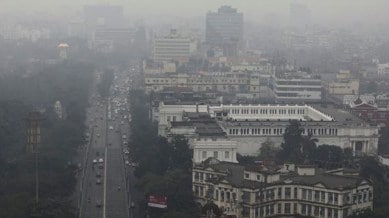Stay updated with the latest - Click here to follow us on Instagram
Air pollution complaints in Mumbai up by 305% in last 5 years: Study
According to a report published by the Praja Foundation, the city's air quality has also deteriorated by 22 per cent between 2019 and 2023.

Complaints pertaining to air pollution in Mumbai city have gone up by 305 per cent over the past five years, according to a report published by the Praja Foundation on Tuesday.
According to the report, the city’s air quality has also deteriorated by 22 per cent between 2019 and 2023.
monthly limit of free stories.
with an Express account.
The report procured data from the BMC’s centralised complaint registration system (CCRS), where citizens lodge complaints on civic issues like pollution, solid waste management, drainage and water supply.
While 169 complaints related to air pollution were registered in 2019, citizens raised 658 complaints about the same issue in 2023, indicating a stark rise. Meanwhile, overall pollution related grievances, which encompass air pollution, noise pollution, etc., also soared by 183 per cent in the past five years.
Even as the report showed that overall air quality worsened by 22 per cent in the past five years, in 2023, data furnished by the Central Pollution Control Board (CPCB) showed that the air quality index (AQI) in 2023 fell under the “good” category for 15 per cent of the days, while 19 per cent (71 days) and 26 per cent (96 days) of the days registered satisfactory and moderate air quality respectively. Two days recorded very poor AQI in the past year.
According to the report, overall complaints witnessed a jump of 50 per cent between 2014 and 2023. In 2014, a total of 80,420 complaints were registered, while the number of complaints touched 1,20,296 in 2023. Of this, the maximum number in 2023 were raised with the Solid Waste Management department, which received 24,690 complaints, followed by those pertaining to drainage (18,751) and licences (13,673).
Despite the increased grievances, the Praja study found that the civic body took nearly 32 days to resolve a flagged issue, even though the BMC’s citizen charter prescribes that a civic complaint must be closed within an average of six days.
With the civic elections due for the past two years and the absence of elected representatives, according to the NGO, deliberations on civic issues have taken a hit in recent years with citizens having to face confusion over whom to approach to resolve an issue. Speaking to reporters, Milind Mhaske, CEO of Praja Foundation, said, “Councillors are the first point of contact and last mile connectivity to raise and address urban issues of the city. In the absence of councillors and any other alternative, nuances of public issues are not being deliberated.”